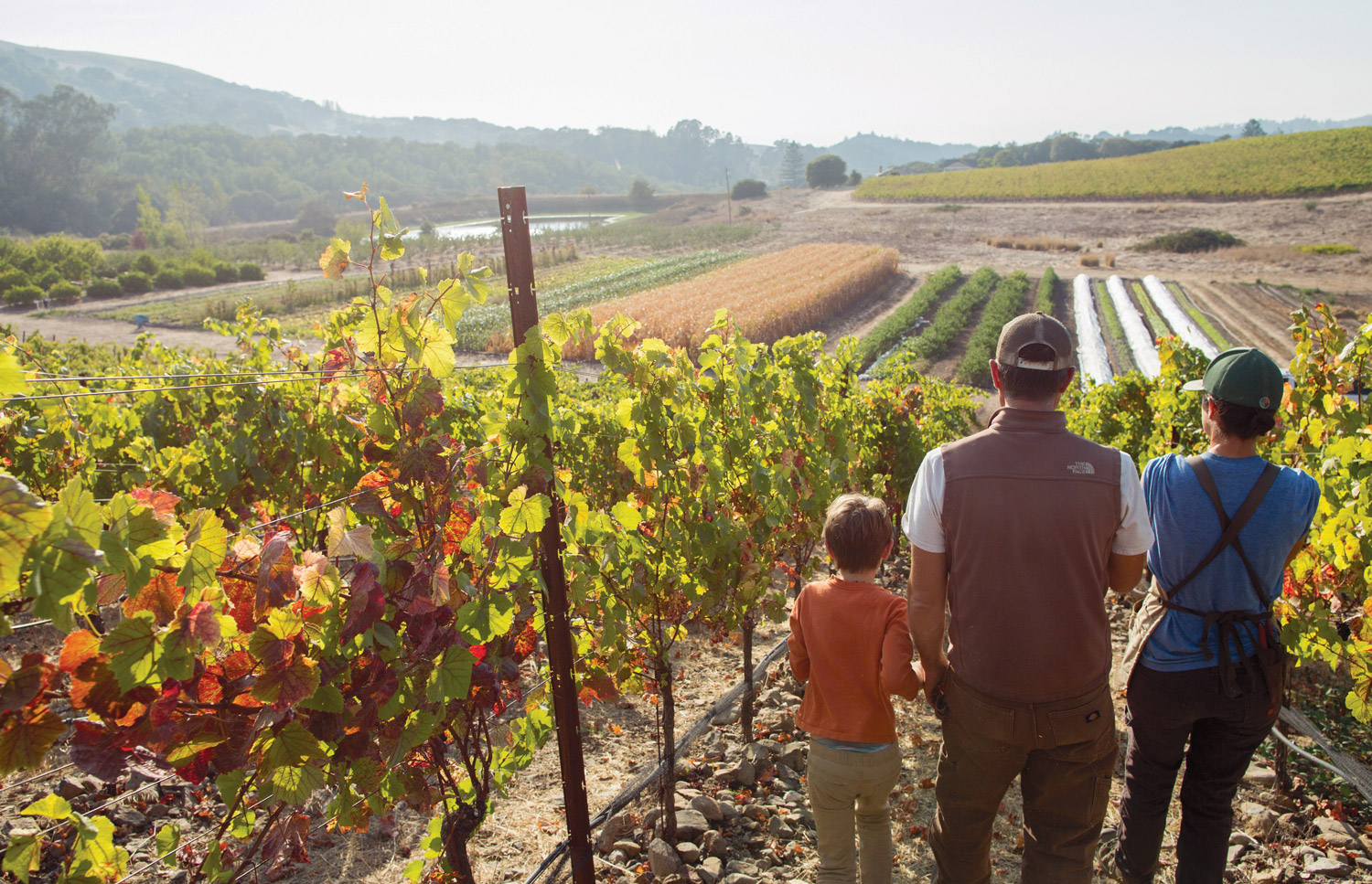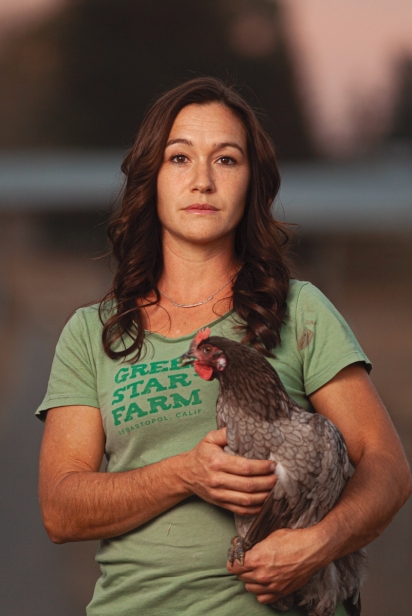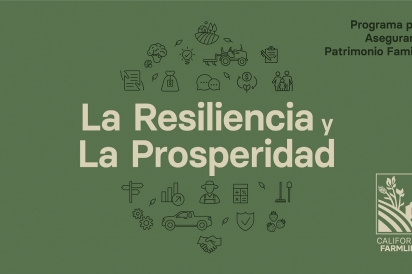California Farmlink
Linking Farmers to Farm Land
Vince and Jenny Trotter’s story is unique, and at the same time almost universal in the emergent sustainable farming generation: After years of working on other people’s farms, the husband-and-wife team had the agricultural experience needed to start their own farm, but not the financial resources to purchase a property or the expertise to navigate the legal complexities of leasing land.
As a young man, Vince Trotter had taught in a remote rural village in Japan, an experience he says planted the seed of his dream to become a farmer. Fortunately, Jenny—the woman who would become his wife—shared this dream. One day they would own their own farm, and they would name it Kibo (pronounced kee-bōh), which means “wish” or “hope” in Japanese.
After years well spent learning the trade while toiling in someone else’s soil, the couple began to look for property they could call their own. A lucky connection introduced them to Lauren and Nate Belden, whose vineyard, Belden Barns, graces the northern slope of Sonoma Mountain southeast of Santa Rosa. The Beldens were interested in diversifying their wine grape property and could spare the four acres the Trotters were looking for on which to grow orchard trees and row crops. But neither family knew how to structure the lease agreement.
Enter California FarmLink, aka the “fairy godmother” of the California small-scale ag world, a Northern California– based nonprofit with a stated mission “to help establish a healthy food system where farmers and ranchers have equitable opportunities to build wealth and conserve natural resources.”
The organization was launched in 1999 with a primary goal to help provide equal access to land and opportunity across California, with a focus on serving farmers of color and beginning and sustainable farmers. Their efforts actually serve the needs of every single Californian in the context of the state’s struggling and aging agricultural industry. According to the U.S. Department of Agriculture (the USDA), between 2004 and 2018 farmland inflation rates increased by approximately 150% and, based on the most recent USDA data (2017), farmers and ranchers over age 65 now outnumber farmers and ranchers under 35—by more than 6 to 1. California not only needs a new farmers, it needs new younger farmers who, having come of age under the shadow of climate change, embrace regenerative farming techniques that help address major environmental issues.
Vince and Jenny Trotter are part of this growing generation of sustainable farmers who are ready to grow but need support in order to establish a thriving ag business, and their “wish, Kibo Farm, is the type of small-scale farm California FarmLink strives to serve.
When the Trotters began discussions with the Beldens about leasing a portion of their land, FarmLink stepped in to assist as they defined a framework for their dream collaboration. “FarmLink did some facilitation with us and the Beldens to help us figure out different ways the relationship and lease could be structured,” says Jenny Trotter.
In 2015, the Trotters began planting crops on the Belden Barns property— tree fruits, heirloom tomatoes, melons, lettuce, baby corn, specialty Asian vegetables, as well as storage crops like heirloom dry beans, milling corn and popcorn.
“We are in an area where land is at a premium, so it has been great to have this opportunity, and to have the Beldens willing to share equipment and water and power with us,” continues Trotter. “They are interested in what we are growing and want to learn about our crops and orchards. It is an awesome collaboration.” Indeed, in April 2021, Belden Barns released their first estate-grown cider, made with Kibo Farm apples.
Initially, California farmers looked to FarmLink primarily as a matchmaker, linking aspiring farmers to available agricultural properties, both public and private, and facilitating succession plans—the older generation ceding the land to younger kin or to other young farmers who did not have the resources to purchase property, but would lease and farm the land. Over the years, the program offerings and farmer support has expanded to include not just connections and facilitation, but education—teaching farmers the nitty gritty of financial, legal and business management. The nonprofit also offers loans and guidance in finding outside lenders and securing loans and leases. Today, 1,500 farmers across California turn to FarmLink for farm business training programs, as well as connections to lenders, investors, public agencies and other nonprofits. The organization is now a certified Community Development Financial Institution (CDFI), which means they work with underserved people and markets, making loans from $2,500 to $1.4 million to 280 distinct small to midsize agricultural businesses.
From Jenny Trotter’s perspective, one of the most valuable California FarmLink offerings is a “Business Resilience Intensive” course, now called The Resilerator. Presented in a webinar format during the pandemic, The Resilerator blends group education with one-on-one technical assistance and is designed to help farmers and ranchers become more robust and able to withstand the vicissitudes of farming.
“In the course, farmers are diving into the kinds of topics that are easily put aside,” says California FarmLink Program Coordinator Kerry McGrath. “But these are things that farmers need to know about: business structures, taxes and insurance. For some farmers, it’s like ripping off a Band-Aid; they know it needs to be done, and we’re providing the course and one-on-one follow-up to ease the sting.”
While agricultural businesses will always be especially vulnerable to weather systems—both environmental and market-related—the Resilerator course offers guidance in best management practices. “There are a lot of resources for farmers that cover various aspects of farm legal and financial management and regulatory compliance—but often it is hard for farmers to place that information in the context of a plan for building out all of the business infrastructure of a farm,” says Poppy Davis, the FarmLink program consultant who teaches The Resilerator course. “For example, it is easy for a farmer to take a class on how to calculate the cost of production for a crop—but those classes don’t explain how that kind of cost-accounting works differently from regular bookkeeping. It is easy to take a class on food safety—but classes on food safety don’t talk about limiting liability through forming an LLC (a limited liability company). And there are plenty of classes about forming an LLC, but those classes don’t go on to explain that an LLC is nothing if it does not have its own accounting.” Davis’ goal is to help farmers and ranchers develop an overarching vision for their business and financial management, and the knowledge to realize that vision.
Jenny Trotter credits the Resilerator course for the transformation of the Kibo Farm accounting system. “Sometimes it is the most simple things that you need help with,” she says. “For example, I felt like I had a fairly good grasp of Quick- Books, but I was self-taught. So to be given a basic chart of accounts for a farm business, the best way to organize things, that has had a ripple effect.” With this new organization of her accounting, Trotter can generate reports that help her make business decisions based on data.
By definition, farmers and ranchers must learn to live with elements beyond their control, and the COVID-19 pandemic is an example of this type of susceptibility. The historic unfolding has provided ample opportunities for small farmers to use beyond-the-field management skills to adapt to a diminished marketplace. Kibo Farm’s business was heavily impacted by the shutdown of restaurants, a primary market for their specialty crops. To carry them through, they decided to plant only half their normal number of row crops this year, and FarmLink was there to help the Trotters apply for PPE loans.
Across Highway 101 and about 15 miles west of Kibo Farm, on the 85-acre Green Star Farm in Sebastopol, Sarah Silva recently decided to increase her poultry population from 2,000 to 6,000 based on analysis tools she gained in The Resilerator course. And, with credit to instruction with respect to budgeting, Silva had already pivoted her business away from farmers’ markets, a move that has helped Green Star survive the pandemic.
“Monthly cash flow budgeting helped me to make decisions based on analysis, not emotion,” says Silva. “For instance, right before the pandemic our local slaughterhouse shut down, which meant I could not offer fresh meat. Cash flow budgeting helped me to look at whether selling at farmers’ markets made financial sense in that situation—it didn’t.
Green Star raises and sells eggs, pastured poultry and pork, grass-fed lamb and foraging goat, so not having a local slaughterhouse was a big hit for the business. In the months since, Silva has joined forces with 35 other local ranchers and farmers to establish the Bay Area Rancher’s Cooperative (BAR-C), a group working together to establish a mobile harvest and cut-and-wrap facility. The alternative is a 150+ mile drive to access those services. Recently, BAR-C identified a property in West Petaluma where it will be able to locate the mobile harvesting unit once they raise the needed funds. “FarmLink is helping us with this also,” says Silva. “They have advised us on financing, land acquisition and easement questions as it relates to this property.”
Fellow Resilerator alums Trotter and Silva help co-teach the current course, returning to share their hard-earned wisdom with the more recent cohorts. “It is so helpful to become part of a group with other people who are in a similar spot, struggling with the same things,” says Trotter. She and Silva agree that one of the most effective parts of the course is learning from other farmers and ranchers who can describe how suggested management approaches play out on the ground.
That’s another goal of California FarmLink: to encourage an ecosystem of California farmers who network and support each other. As any good fairy godparent knows, the idea is to offer support while encouraging self-resilience. And, of course, the key is to be available to offer that support at just the right time. In Jenny Trotter’s words, “One of the best things about FarmLink is that there’s someone to call—someone who understands.”
CaliforniaFarmLink.org
KiboSonoma.com
GreenStarFarm.com
BayAreaRanchers.com







